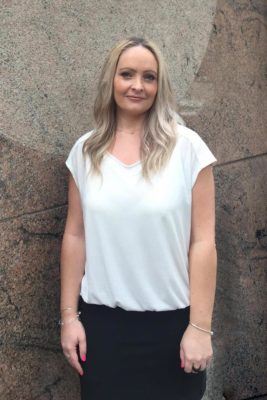This Powerful Documentary Wants You to Rethink What Having a “Good Body” Means
The term “bikini body” may be on the way out (and the cellulite-acceptance movement on the way in), but no matter how many #EffYourBeautyStandards tags dominate Instagram, negative body image is still a very real thing.

In fact, according to Jenny McQuaile, a New York-based journalist and documentary filmmaker, 90 percent of women and young girls still say they feel underrepresented in the fashion industry and traditional media. But with her new body-positive documentary Straight/Curve, she's hoping to change the conversation.
The powerful film (which airs on EPIX Wednesday, June 21 at 8 p.m. EST) offers a no-holds-barred look at what designers, editors and fashion industry insiders can be doing better—or rather, need to be doing better—to fix their representation problem. “But it’s not just a film for the fashion industry, it’s a film for everybody,” notes McQuaile. “Imagery is everywhere, and we're assimilating these images into our brains and it’s setting a standard of beauty that we then aspire to be.”
Keep reading for some body-image real talk from McQuaile—plus, watch an exclusive clip from the documentary.
Let’s start with the basics: Why do you think that body positivity is such an important message in today’s society?
Body diversity—or body positivity—is so important because in the film, we have these young teenage girls who talk about how they're influenced by the imagery they’re seeing every single day that are put out there by the fashion industry, by the advertising industry, by media, film, and TV.
We have some teenage girls saying they feel “disgusting” or “less than” on a daily basis. In 2017, it’s not okay for any girl, boy, man, or woman to feel like they can’t achieve something because of how they look. So, if that is happening—and it is happening, because we have people in this film telling us how deeply they are affected by the imagery they’re seeing—that I think we have a responsibility to shift the conversation and fight for more representation.

{{post.sponsorText}}
What's interesting is that there's an amazing focus on size-positivity in the documentary without any sort of “thin shaming.”
It was very important to me and my producers Jessica Lewis, who was a former straight- and plus-sized model, and our other producer, Yael Melamede, to make sure that at no point did the conversation become “straight sized versus plus sized”. It can be the tendency in the media sometimes, to really feel like you have to push the size zeros down in order to rise the bigger sizes up, and I don’t think that’s the case at all. [Body image] affects women of all shapes and sizes—size 0, size 22, size 30, it doesn’t matter. We wanted to make sure that everyone was included in the film.
"What does a 'good body' even mean?"
You mention the division between “straight-sized” and “plus-sized” models. Do you think it’s problematic for models to be put into one of those two categories—as in, what about the women in between?
The fashion industry is divided into straight-sized models, who are size 0-4, and plus-sized models, who are size 10 and above. But this is a "fashion industry indicator"—it’s generally used so that people can book talent to fit their clothing—so it isn’t meant to be applied as a label to the wider society. The industry needs sizing in order to actually be able to function, [but] once the labels become personalized—when we started to apply "plus" to regular women—that’s where the issue really stems from.
The film talks a lot about imagery from traditional media, but what about social media?
In Straight/Curve, we portray social media in a really positive way. It was a really great moment for me to be able to tell the story of how photo-sharing sites like Instagram can actually contribute to the cause for good, and can be a platform to promote real change and promote real body positivity.
One of the characters in the film, Iskra Lawrence, has 5 million followers. I traveled with Iskra to a couple of college campuses around the country with Aerie, and it was amazing and unbelievable to watch the impact she has on young teenage girls. Girls would come up to her and tell her how she really changed their lives. Even young men were coming up to her and saying, “Thank you so much for what you’ve done for my sister, or for my girlfriend.” The impact is undeniable—people are growing up now with role models that are accessible to them. So, that can’t be bad. All of that is a really, really great thing.
If you were to change the way people thought of a “good body”, what would you want to convey?
What does a “good body” even mean? I think it has to become about your individual, personal sense of wellbeing, about feeling healthy in your own body. That’s a really, really personal thing.
Rachel Brathen is also really annoyed by the concept of a "good body". Meanwhile, Misty Copeland has some wise words about feeling comfortable in your own skin.
Loading More Posts...